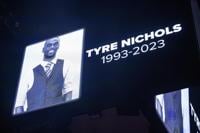ATLANTA (AP) — Herschel Walker campaigns for the U.S. Senate as a champion of free enterprise and advocate for the mentally ill, felons and others at the margins of society. And the Georgia Republican has called for policies that blend those priorities.
“If someone comes out of prison, they should have incentives set up that the person has learned a trade, and you give an incentive for a company to hire him so he can make a living for himself,” Walker said Aug. 17 in Kennesaw, Georgia.
Walker, who founded Renaissance Man Food Services in 1999 as part of America’s sprawling food processing industry, then nodded to his business experience. “It’s my responsibility now to help,” Walker declared.
The argument blends several threads of Walker's bid to unseat Sen. , a Democrat, in a marquee matchup that could determine control of the Senate. A former college and professional football star, Walker styles himself as a businessman, unapologetic Christian and someone who has overcome mental health challenges with others' help.
“We have to become a society that want to help, not hurt anyone,” he said in Kennesaw.
Yet an Associated Press review of federal court cases, alongside other public records and statements, offers a more complicated reality. One instance at the heart of Walker's business portfolio suggests he has benefited, through a firm he touts as a principal partner and supplier, from the unpaid labor of drug offenders routed from state courts to residential rehabilitation programs in lieu of prison.
It’s not possible to quantify any financial gains Walker might have gleaned over the years from undervalued labor. But some lawyers have derided the operation in question, Oklahoma-based Christian Alcoholics & Addicts in Recovery Inc., as a residential “work camp” that profits from a “vulnerable workforce under the guise of providing alcohol and drug counseling and rehabilitation services.”
CAAIR, as it is commonly known, began more than a decade ago sending residents to work at Simmons Foods Inc., a processing giant that Walker touts as a principal partner and supplier to his distributorship, Renaissance Man Food Services. State judges assigned convicted offenders to CAAIR, giving them a choice between the residential program and its requirements or serving time in conventional jails or prisons. Simmons would then contract with CAAIR for labor at its plants; CAAIR program participants were not paid.
U.S. courts have declared that type of arrangement legal, finding it akin to work programs for fully incarcerated inmates who fall outside the 13th Amendment’s ban on involuntary servitude “except as punishment for crime.” But many criminal justice experts are critical of such programs.
“Drug courts are typically a pretrial diversion program,” said Jillian Snider, a former New York City police officer and now policy director for the criminal justice and civil liberties program at R Street, a center-right, free-market think tank based in Washington.
Snider described the ideal design as “almost like an outpatient program” focused on professional counseling and skills training, with some job responsibilities that include wages. Programs based more on work than on rehabilitation and skills training, Snider said, are “unique mostly to Southern states. It's just not something you see in the northeast and in the West.”
A federal lawsuit, still pending against CAAIR and Simmons, has detailed how some participants were allegedly pressured to work when injured, compelled to attend religious services, and threatened with imprisonment if their work was unsatisfactory.
CAAIR, participants alleged in court, did not always provide necessary rehabilitative or psychiatric treatment, the kind that Walker has emphasized when he shares his personal story and advocates for people suffering from mental illness. CAAIR described its services in court filings as “a combination of work therapy and spiritual and religious counseling.”
“If you're working full-time in a chicken facility, you don't have enough hours in the day to complete a full program,” said Snider, explaining that “talking to professional counselors” and “being set up with real educational advancement opportunities and skills training” must be included. “There's a lot more components than working 12 hours a day cleaning chickens,” she said.
Nonetheless, a trial court judge in 2020 rejected participants’ assertions that the program violated federal labor law. CAAIR, the court ruled, remains a permissible component of the state criminal justice system. Participants’ appeal is pending.
CAAIR CEO and co-founder Janet Wilkerson told The Associated Press she “never had any dealings” with Walker. She declined to comment further, citing ongoing litigation.
Neither Walker nor Renaissance Man Food Services was named as a defendant in the original suit, and Walker's campaign declined to comment on the matter, saying Simmons is not Walker's company. A Simmons representative did not respond to inquiries.
Yet in Walker's telling, Simmons is critical to his enterprise.
On the Renaissance website, Simmons is the only supplier or partner mentioned by name: “RMFS joins with Simmons Foods to bring quality poultry, pork and bakery products to the retail and food service marketplace.” The website highlights one of its locations as Siloam Springs, Arkansas, where Simmons is based. The relationship dates back as early as 2006, according to Walker’s previous statements to media.
Renaissance bills itself as a certified minority owned business — Walker is Black — that works with “supplier partners to meet the needs of our retail and food service customers.” That suggests a relationship in which Walker partners with food processing firms to act as distributor so that an end-line business is buying from a minority-owned firm. For example, Walker’s website denotes two “diversity supplier” awards from Marriott hotels.
Walker isn't always clear about the size and scope of Renaissance. He's said he employs hundreds of workers, with frequent mentions of a chicken-processing division in Arkansas. Further, he's claimed as much as $80 million in gross sales. But when Renaissance filed federal paperwork to secure loans under the Paycheck Protection Program during the coronavirus pandemic, it reported eight employees. The company received about $182,000 under the program. In another court case, Walker gave far more modest revenue figures, indicating the company averaged about $1.5 million a year in profit from 2008 to 2017.
Walker's exaggerations could simply involve conflating some of Simmons' operations as his own.
His 2022 financial disclosure form submitted to the Senate list Renaissance as paying Walker a $214,062.50 salary. Another business, H Walker Enterprises, brought Walker a $3 million payout as sole shareholder. The website of H Walker Enterprises suggests Renaissance is a subsidiary. State records list the same corporate address in Dublin, Georgia, for both.
Wilkerson established CAAIR with her husband, Don, and others. It bills itself as a faith-based enterprise to rehabilitate addicts. Its programs launched in 2008 with six men, according to its website, and by 2015 housed 200 in three dorms.
Throughout the litigation, Simmons and CAAIR have forcefully defended their practices. But one thing has never been up for dispute: The men CAAIR sent to the chicken plants were not paid.
“CAAIR is a work-based program,” lawyers wrote in their defense. “Participants ... are required to perform work without compensation at various nearby work-providers, including Simmons. This requirement is no secret.”
In court filings, Wilkerson described drug defendants as “clients” rather than employees, and she characterized them as having chosen the program voluntarily after being fully apprised of the parameters.
Participants signed documents stipulating that they “did not come to CAAIR, Inc., seeking work,” that CAAIR “did not offer (them) a job” and that they would “not receive wages” or other pay for “my stay at CAAIR, Inc.” There was one potential exception: They “may be offered a gift package” if they finished the program.
“Simmons is a work-provider for CAAIR,” Wilkerson wrote in her court filings. “Simmons pays CAAIR for the work performed by CAAIR participants at a rate well above minimum wage.”
Wilkerson described an “intensive interview process” for “clients” referred to her program by the courts: “Prospective clients are required to read and sign paperwork acknowledging their understanding of the program.”
The “Admission Agreement” promises a residential “program of recovery” including “individual and group counseling, nourishing foods (and) constructive physical activity which includes work training at a job site,” along with the requirement of “working at a designated job site.” The documents do not name any prospective companies, describe any training participants would receive or detail any labor they would perform.
The agreement included a behavioral code, with the threat of dismissal.
“Minor rules violations” included “failure to maintain a positive attitude,” “failure to do assigned chores,” “not shaving, showering and brushing your teeth every day,” “not being a team player” and “failure to attend ... daily meetings,” including “Bible study ... 12-step meetings ... small group.”
Among the major violations: “theft,” “bringing or using drugs or alcohol,” “insubordination,” “having money or credit cards on the premises,” “failure to maintain your position at your assigned work provider,” “horseplay or wrestling at any time,” and “fraternizing with any females.”
Those lists, participants were warned, were “not comprehensive,” and that “other infractions” determined by staff “may also result in disciplinary procedures.” Further, participants agreed to attend church services off premises during their first 12 weeks in residence. That came with a separate code: “No sleeping in church. ... Use the restroom before church services start. ... Clients may not ride with family to/from church.”
Participants were “free to leave (the program) at any time,” the documents state. But participants signed on to the knowledge that such an action could result in “consequences from the criminal justice system for early departure,” and the documents make clear that “disciplinary procedures,” up to and including “dismissal from the program” was at CAAIR staff's discretion.
In a separate federal case against another not-for-profit rehabilitation program, Simmons again defended its practices in a “friend of the court” brief submitted in 2020 to support DARP Inc.
Citing Simmons’ relationship with CAAIR, Simmons lawyers wrote that “CAAIR operates on the same basic model” as DARP to “provide vocational opportunities for those struggling with drug and alcohol addiction.” However, Simmons’ lawyers said, that’s not the same as an employee relationship requiring federal labor law protections — or even compensation.
“Plaintiffs participated in DARP for their own benefit and to achieve their own rehabilitation, not for the benefit of DARP” or any for-profit firm, the brief states. The lawyers said unpaid laborers receive a benefit beyond money: “a sense of self-worth and accomplishment.”
___
Follow AP’s coverage of the elections at:
Check out to learn more about the issues and factors at play in the 2022 midterm elections.










































